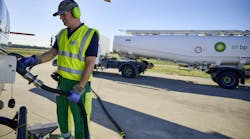Aug. 19--It's all about the boom.
For more than a decade, Savannah-based Gulfstream Aerospace has dedicated a team of engineers and other researchers to finding a way to diminish the bone-jarring sound of an aircraft breaking the sound barrier.
Some seven years ago, Gulfstream rolled out its "Quiet Spike" sonic boom mitigation system on a NASA F-15 jet, which had been testing the structural integrity of the device.
Last month, the business jet manufacturer won U.S. Patent 8,789.789 for a "supersonic aircraft with spike for controlling and reducing sonic boom."
This month, two more Gulfstream patent applications have been revealed, the first for "Systems and methods for controlling magnitude of a sonic boom" and the second for "A propulsion system using large-scale vortex generators for flow redistribution and supersonic aircraft equipped with the propulsion system."
Although the company makes it a practice not to talk about projects in development, it's beginning to look like Gulfstream is getting closer to a viable supersonic business jet.
Propulsion is one key factor, with engines designed to handle the higher heat supersonic speeds generate. It appears Gulfstream has resolved that issue with its patent application for a propulsion system.
But the biggest obstacle has always been the resolution of the sonic boom.
The Federal Aviation Administration has banned supersonic flight over land because of the damage shock waves from a sonic boom can produce. On a global level, the International Civil Aviation Organization requires supersonic flight over land not create an audible disturbance on the ground.
Since the successful completion of its Quiet Spike program with NASA in 2007, Gulfstream has been working to incorporate the device in a low-boom configuration aircraft.
But the disclaimer remains the same, according to Steve Cass, Gulfstream's vice president for communications.
"From the beginning, we've made it clear that we are not going to begin building a quiet supersonic aircraft prototype until its operation is approved by the respective aviation authorities for use over land," Cass said Monday.
"Unfortunately, that's not going to happen tomorrow."
Copyright 2014 - Savannah Morning News, Ga.


